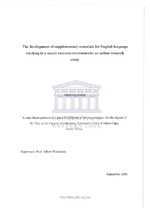| dc.contributor.advisor | Weideman, Albert | |
| dc.contributor.author | Habte, Abrahaley | |
| dc.date.accessioned | 2020-10-29T11:12:14Z | |
| dc.date.available | 2020-10-29T11:12:14Z | |
| dc.date.issued | 2001 | |
| dc.identifier.uri | http://hdl.handle.net/11394/7387 | |
| dc.description | Magister Philosophiae - MPhil | en_US |
| dc.description.abstract | Task based language instruction has generated some debate among researchers. Some argue in favour of task based language instruction by claiming that tasks focus learners' attention on meaning and thus facilitate second language acquisition (Prahbu, 1987; Pica and Doughty, 1986; Pica, Kanagy, and Falodun,1993). Others argue against task based language instruction and call into question the concept of comprehensible input, the idea upon which the whole task based approach is based (Sheen, 1994). | en_US |
| dc.language.iso | en | en_US |
| dc.publisher | University of Western Cape | en_US |
| dc.subject | Supplementary materials | en_US |
| dc.subject | English language | en_US |
| dc.subject | Task based language | en_US |
| dc.subject | Information gap tasks | en_US |
| dc.title | The development of supplementary materials for English language teaching in a scarce resource environment: an action research study | en_US |
| dc.rights.holder | University of Western Cape | en_US |

